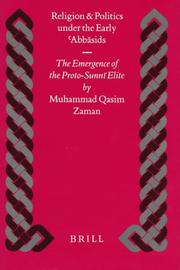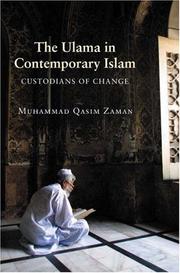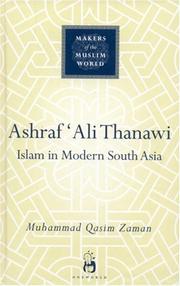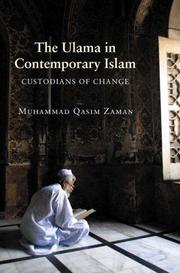| Listing 1 - 10 of 22 | << page >> |
Sort by
|
Book
ISBN: 9781107096455 1107096456 9781107422254 1107422256 9780511973062 9781139571234 1139571230 9781139569422 1139569422 0511973063 1139572989 9781139572989 1316090450 9781316090459 1139579800 9781139579803 1107255066 9781107255067 1283637731 9781283637732 1139570323 9781139570329 Year: 2012 Publisher: Cambridge: Cambridge university press,
Abstract | Keywords | Export | Availability | Bookmark
 Loading...
Loading...Choose an application
- Reference Manager
- EndNote
- RefWorks (Direct export to RefWorks)
Among traditionally educated scholars in the Islamic world there is much disagreement on the crises that afflict modern Muslim societies and how best to deal with them, and the debates have grown more urgent since 9/11. Through an analysis of the work of Muhammad Rashid Rida and Yusuf al-Qaradawi in the Arab Middle East and a number of scholars belonging to the Deobandi orientation in colonial and contemporary South Asia, this book examines some of the most important issues facing the Muslim world since the late nineteenth century. These include the challenges to the binding claims of a long-established scholarly consensus, evolving conceptions of the common good, and discourses on religious education, the legal rights of women, social and economic justice and violence and terrorism. This wide-ranging study by a leading scholar provides the depth and the comparative perspective necessary for an understanding of the ferment that characterizes contemporary Islam.
Islam --- Islamic sociology --- doctrines --- Islamic sociology. --- 297 --- Dogma, Islamic --- Islamic theology --- Kalam --- Muslim theology --- Theology, Islamic --- Theology, Muslim --- Muslim sociology --- Sociology, Islamic --- Sociology --- Doctrines. --- Islam. Mohammedanisme --- Doctrines --- Arts and Humanities --- History --- Islam - 21st century --- Islam - Doctrines

ISBN: 9004106782 9004493190 Year: 1997 Publisher: Leiden : E.J. Brill,
Abstract | Keywords | Export | Availability | Bookmark
 Loading...
Loading...Choose an application
- Reference Manager
- EndNote
- RefWorks (Direct export to RefWorks)
Islam and politics --- -Ulama --- -Ulema --- Islam --- Muslim scholars --- Politics and Islam --- Political science --- Functionaries --- Political aspects --- Islamic Empire --- -Arab countries --- Arab Empire --- Empire, Islamic --- Middle East --- Muslim Empire --- Politics and government --- History --- -Islamic Empire --- -Politics and government --- Ulama --- Ulema --- Politics and government.

ISBN: 1282964682 9786612964688 1400837510 9781400837519 0691096805 9780691096803 9780691130705 0691130701 9781282964686 6612964685 Year: 2002 Publisher: Princeton: Princeton university press,
Abstract | Keywords | Export | Availability | Bookmark
 Loading...
Loading...Choose an application
- Reference Manager
- EndNote
- RefWorks (Direct export to RefWorks)
From the cleric-led Iranian revolution to the rise of the Taliban in Afghanistan, many people have been surprised by what they see as the modern reemergence of an antimodern phenomenon. This book helps account for the increasingly visible public role of traditionally educated Muslim religious scholars (the `ulama) across contemporary Muslim societies. Muhammad Qasim Zaman describes the transformations the centuries-old culture and tradition of the `ulama have undergone in the modern era--transformations that underlie the new religious and political activism of these scholars. In doing so, it provides a new foundation for the comparative study of Islam, politics, and religious change in the contemporary world. While focusing primarily on Pakistan, Zaman takes a broad approach that considers the Taliban and the `ulama of Iran, Egypt, Saudi Arabia, India, and the southern Philippines. He shows how their religious and political discourses have evolved in often unexpected but mutually reinforcing ways to redefine and enlarge the roles the `ulama play in society. Their discourses are informed by a longstanding religious tradition, of which they see themselves as the custodians. But these discourses are equally shaped by--and contribute in significant ways to--contemporary debates in the Muslim public sphere. This book offers the first sustained comparative perspective on the `ulama and their increasingly crucial religious and political activism. It shows how issues of religious authority are debated in contemporary Islam, how Islamic law and tradition are continuously negotiated in a rapidly changing world, and how the `ulama both react to and shape larger Islamic social trends. Introducing previously unexamined facets of religious and political thought in modern Islam, it clarifies the complex processes of religious change unfolding in the contemporary Muslim world and goes a long way toward explaining their vast social and political ramifications.
Muslim scholars. --- Ulama. --- Islamic scholars --- Scholars, Muslim --- Scholars --- Ulema --- Islam --- Muslim scholars --- Functionaries --- Ulama --- #SBIB:316.331H421 --- #SBIB:39A10 --- Morfologie van de godsdiensten: Islam --- Antropologie: religie, riten, magie, hekserij --- Islam and politics. --- Ulémas --- Islam et politique --- Political sociology --- Middle East

ISBN: 9781851684151 1851684158 Year: 2008 Publisher: Oxford: Oneworld,
Abstract | Keywords | Export | Availability | Bookmark
 Loading...
Loading...Choose an application
- Reference Manager
- EndNote
- RefWorks (Direct export to RefWorks)
Book
ISBN: 3631635303 9783631635308 Year: 2011 Publisher: Frankfurt am Main ; New York : Peter Lang,
Abstract | Keywords | Export | Availability | Bookmark
 Loading...
Loading...Choose an application
- Reference Manager
- EndNote
- RefWorks (Direct export to RefWorks)
Arranged marriage --- Eheschliessung. --- Ehevermittlung. --- Families --- Marriage customs and rites --- Sozialstruktur. --- Verwandtschaftssystem. --- Sociological aspects --- Pandschab (Pakistan).
Book
ISBN: 9789004493193 9789004106789 Year: 1997 Publisher: Leiden; Boston : BRILL
Abstract | Keywords | Export | Availability | Bookmark
 Loading...
Loading...Choose an application
- Reference Manager
- EndNote
- RefWorks (Direct export to RefWorks)
The main concern of this book is the religious policies of the early 'Abbāsid caliphs. It focuses on the religious trends which went into the making of Sunnī Islam, and traces the emergence of the nascent Sunnī elite in relation to the 'Abbāsids. Various aspects of the caliphs' evolving relationship with the religious scholars are studied and the nature of caliphal patronage and its impact on the scholars, and ultimately on the evolution of early Sunnism, is explored. What emerges is a picture of close collaboration between the caliphs and the 'ulama', with the caliphs playing an active and multifaceted role in religious life. This book challenges the prevailing interpretations of the separation of religion and politics in early Islam, and offers new insights into the social and religious history of Islam's formative centuries.
Islam and politics --- Ulama --- Islamic Empire --- Politics and government.
Book
ISBN: 9781400889747 Year: 2018 Publisher: Princeton, NJ
Abstract | Keywords | Export | Availability | Bookmark
 Loading...
Loading...Choose an application
- Reference Manager
- EndNote
- RefWorks (Direct export to RefWorks)
Digital
ISBN: 9780511973062 Year: 2012 Publisher: Cambridge Cambridge University Press
Abstract | Keywords | Export | Availability | Bookmark
 Loading...
Loading...Choose an application
- Reference Manager
- EndNote
- RefWorks (Direct export to RefWorks)

ISBN: 9781400837519 9780691130705 Year: 2010 Publisher: Princeton, N.J. Princeton University Press
Abstract | Keywords | Export | Availability | Bookmark
 Loading...
Loading...Choose an application
- Reference Manager
- EndNote
- RefWorks (Direct export to RefWorks)
Multi
ISBN: 9781400889747 9780691149226 Year: 2018 Publisher: Princeton, N.J. Princeton University Press
Abstract | Keywords | Export | Availability | Bookmark
 Loading...
Loading...Choose an application
- Reference Manager
- EndNote
- RefWorks (Direct export to RefWorks)
| Listing 1 - 10 of 22 | << page >> |
Sort by
|

 Search
Search Feedback
Feedback About UniCat
About UniCat  Help
Help News
News